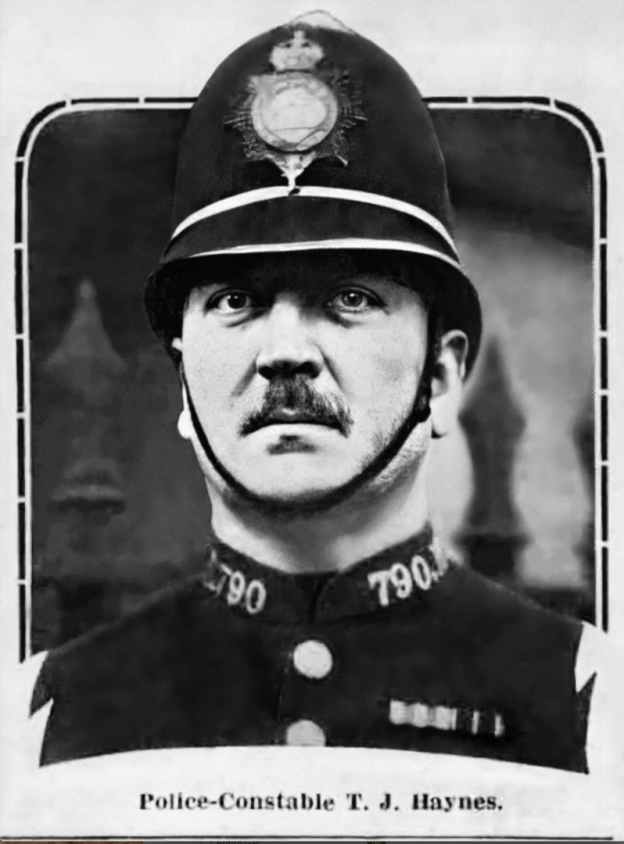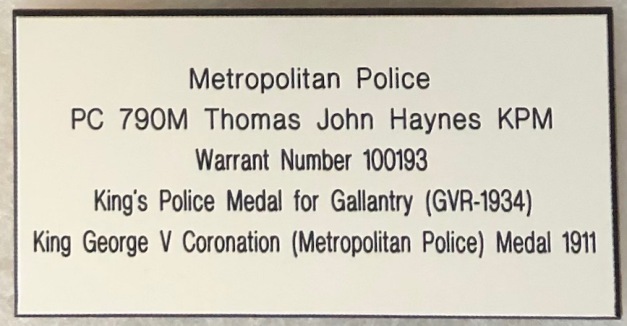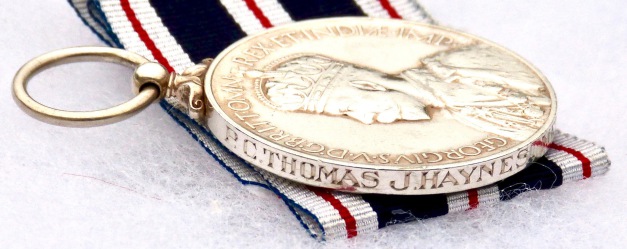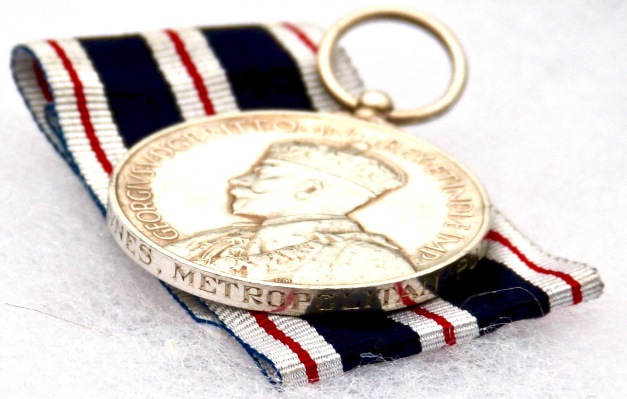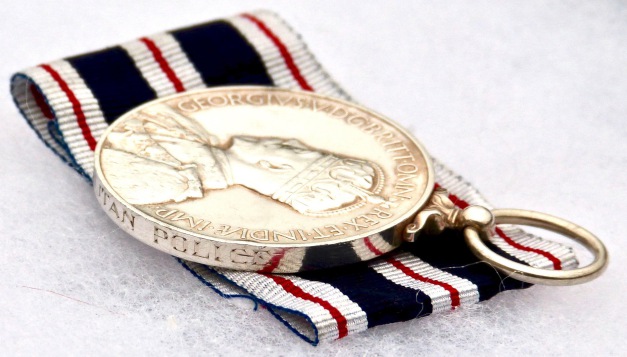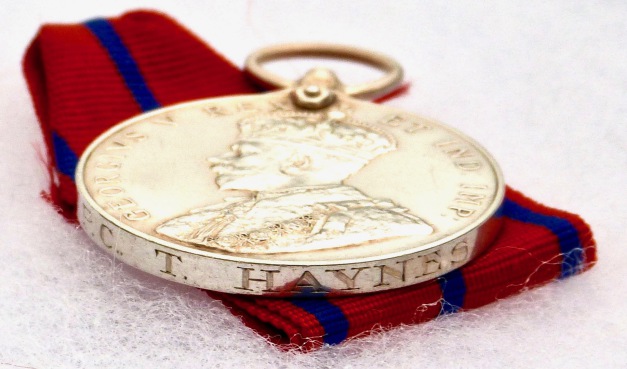
The Metropolitan Police - PC 790M Thomas John Haynes KPM
Metropolitan Police
PC 790M Thomas John Haynes, KPM
King’s Police for Gallantry (GVR 1934)
King George V Coronation (Metropolitan Police) Medal 1911
Introduction
Thomas John Haynes was born in the ‘Militia Barracks’, Aberdeen in July 1889. His father, Henry Haynes, was a Colour Sergeant on the Permanent Staff of the 3rd Battalion Gordon Highlanders, having previously served for over 21 years with the 50th Regiment of Foot in Ceylon, Australia, New Zealand, Britain and Ireland. His mother was Rhoda Hookings or Haynes. They had been married in Exeter, Devon in 1870. According to the census of England 1911, Rhoda gave birth to ten children, nine of whom were still alive in that year. Thomas was the second youngest.
The family continued to live in the Militia Barracks at least until 1892 as Thomas’ younger sister was born there that year. Henry was discharged from the Army for the second time, in September the same year. I think the family may have moved to Worcestershire by the census of 1901. Thomas was a pupil at the Duke of York’s Royal Military Asylum (DYRMA) in Chelsea, London, according to the census. The DYRMA was set up in 1803, originally for the orphans of servicemen killed in the Napoleonic Wars. His father had died in Worcestershire in 1895.
By 1904, Thomas was back living in Worcester and employed by the Great Western Railway, initially as an Engine Cleaner, but later as a Locomotive Fireman. That was his occupation when he was appointed to the Metropolitan Police.
Thomas joined the Metropolitan Police in June 1911 with the Warrant Number 100193 and was posted to Southwark with the collar number PC 90M.
Later that year, he married Lucy Alice Smith in Martley, Worcestershire.
In August 1932, PC Haynes was seriously injured whilst stopping a pair of runaway heavy horses in Rotherhithe and was unfit
for duty for several months afterwards. His High Court case for damages, ‘Haynes v G. Harwood & Son’ which ended up in the Appeal Court, set the precedent that a police officer when acting to save life and property and is injured, he (or she) is not taking a ‘voluntary risk’, he (or she), are acting upon a higher duty and have the right to sue those whose negligence resulted in their injury. [i]
PC Thomas John Haynes retired in June 1936 and in the Register of England & Wales, 1939, the couple were living at the Berkeley Arms, Egdon, Worcestershire. His occupation was given as ‘Inn Keeper. The couple were still managing the pub in 1946.
Thomas John Haynes, KPM, (63) died in Worcester in 1952. His wife, Lucy Alice Smith or Haynes, (70), also died there in 1954.
[i] Haynes v Harwood, (1935) 1. Kings Bench Division 146.
The Early Years
Register of Births in the District of Pershore in the County of Worcester 1843
Henry Haynes, Thomas John Haynes father, was born in the second quarter of 1843 at Pershore, Worcestershire, England. His record can be found in Volume 18, page 430.
Census of England & Wales 1851
The following were living at 27 Union Street, Worcester on the night of the Census of England & Wales, 1851. Henry Haynes is the father of Thomas John Haynes, KPM. [i]
|
Name & Age |
Occupation |
Place & County of Birth |
|
John Haynes, (45) |
Tailor |
Worcester, England |
|
Elizabeth Haynes, (34) |
Shoe Binder |
Worcester, England |
|
Edward Haynes, (18) |
Shoemaker |
Worcester, England |
|
John Haynes, (16) |
Tailor |
Worcester, England |
|
George Haynes, (14) |
Errand Boy |
Worcester, England |
|
Henry Haynes, (8) |
Scholar |
Worcester, England |
|
Elizabeth Haynes, (7) |
Scholar |
Worcester, England |
|
Herbert Haynes, (6) |
Scholar |
Worcester, England |
|
Walter Haynes, (4) |
|
Worcester, England |
|
Thomas Haynes, (20 |
|
Worcester, England |
Census of England & Wales 1851
The following were living at South Wonford, Heavitree, St Thomas, Devon, on the night of the Census of England & Wales, 1851. John and Sarah Hookings are the parents of Rhoda Hookings, Thomas Haynes’ mother.
|
Name & Age |
Occupation |
Place & County of Birth |
|
John Hookings, (37) |
Agricultural Labourer |
Sowton, Devon |
|
Harriet Hookings, (14) |
Scholar |
Broad Clist, Devon |
|
Sarah Hookings, (12) |
Scholar |
Broad Clist, Devon |
|
Henry Hookings, (10) |
Scholar |
Heavitree, Devon |
|
Georgina Hookings, (7) |
Scholar |
Heavitree, Devon |
|
Mark Hookings, (4) |
|
Heavitree, Devon. |
John Hookings wife, Sarah Hookings, (37), born in Stockland, Devon about 1814, was a patient in the Devon and Exeter Hospital, Exeter on the night of the Census of England & Wales, 1851. [ii]
Register of Births in the District of St Thomas in the County of Devon 1852
Rhoda Hookings, Thomas John Haynes mother, was born on 12 January 1852 at Wonford, Heavitree, St Thomas, Devon, England. Her father was John Hookings a Labourer, and her mother, Sarah Priddy or Hookings. Her record can be found in Volume 5b, page 60.
Records of the Worcester Regiment of Militia 1857
The records of the Worcestershire Regiment of Militia record that Henry Haynes was enrolled as Volunteer, No. 2046 on 31 August 1857. On 29 September, he signed a declaration releasing him from his obligation as a Volunteer for the repayment sum of 18/6d in order to enable him to enlist in the 50th Regiment of Foot.
Henry Haynes was described as ’18 years old, 5’ 6” tall, hazel eyes and a fresh complexion’. [iii]
Records of the 50th Regiment of Foot 1857
Henry Haynes, (18) enlisted as Private No. 223 in the 50th Regiment of Foot on 1 October 1857.
Census of England & Wales 1861
The following were living at South Wonford, Heavitree, St Thomas, Devon, on the night of the Census of England & Wales, 1861. Rhoda Hookings is the mother of Thomas John Haynes.
|
Name & Age |
Occupation |
Place & County of Birth |
|
John Hookings, (46) |
Labourer |
Clyst Honiton, Devon |
|
Sarah Hookings, (48) |
Wife |
Stockland, Devon |
|
Mark Hookings, (74) |
Labourer |
Heavitree, Devon |
|
Rhoda Hookings, (8) |
Scholar |
Heavitree, Devon |
|
Albert Hookings, (6) |
Scholar |
Heavitree, Devon. |
Register of Births in the District of St Thomas in the County of Devon 1868
Georgina Hookings was born in the 2nd quarter of 1868 in the District of St Thomas in the County of Devon. Her record can be found in Volume 5b, page 67. [iv] This may be the birth of Rhoda Hookings first child.
Medal Roll of the 50th (Queen’s Own) Regiment of Foot 1869
The medal roll of the 50th (Queen’s Own) Regiment of Foot, dated 22 July 1869 at Devonport, England, which lists the ‘Claims to the New Zealand Medals under the General Order 17 of 1869’ list the following entitlement and actions in which the soldier was involved, ‘Haynes, Henry, 227, Private, Waikato and West Coast Campaigns, from 15 Nov. 1863 to16 Sept. 1866’. [v]
Private Henry Haynes’ New Zealand Medal entitlement is also listed in his records of service.
Census of England & Wales 1871
The following were living at South Wonford, Heavitree, St Thomas, Devon, on the night of the Census of England & Wales, 1871.
|
Name & Age |
Occupation |
Place & County of Birth |
|
John Hookings, (59) |
Labourer |
Clyst Honiton, Devon |
|
Sarah Hookings, (60) |
Wife |
Stockland, Devon |
|
Rhoda Hookings, 19) |
Servant |
Heavitree, Devon |
|
Albert G. Hookings, (17) |
Chandler |
Heavitree, Devon |
|
John Hookings, (9) |
Scholar |
Heavitree, Devon |
|
Georgina Hookings*, (2) |
Daughter |
Heavitree, Devon |
Census of England & Wales 1871
On the night of the Census of England & Wales 1871, among the soldiers listed at the South Camp, Aldershot, Frimley, Farnham, Hampshire that was the following. [vi]
|
Name & Age |
Occupation |
Place & County of Birth |
|
Henry Haynes, (31) |
Private Soldier, 50th Regiment |
Worcester, Worcestershire |
(Author’s Note: It appears that Henry and Rhoda are married in 1870 but still living apart in the census of 1871? GM 20.11.2021).
England & Wales Civil Registration Birth Index, 1871
The England & Wales Civil Registration Birth Index, 1871 records that Elizabeth Rhoda Haynes was born on 14 May 1871 at South Wonford, Heavitree, St Thomas, Devon. Her father was Henry Haynes, a Private Soldier in the 50th Queen’s Own Regiment and her mother, Rhoda Hookings or Haynes. Her entry can be found in Volume 5b, page 68. [vii] This is the birth of Thomas Haynes eldest sister.
Register of Births in England 1874
Alice Haynes, daughter of Sergeant Henry Haynes and Rhoda Hookings was born in England, probably in 1874. She appears in the Census’ of 1881 and 1891 in Aberdeen, but so far, I have found no other trace of her. Alice is Thomas’ 2nd eldest sister.
Register of Births in the District of Nenagh in the County Tipperary, Ireland 1875
Page 542 of the Register of Births in the District of Nenagh in the County Tipperary, Ireland for 1875, under entry No. 22 records that on 1 December 1875, at Nenagh Barracks, Elizabeth Hariet (sic) Haynes was born. Her mother was Rhoda Haynes, formerly Hookings, and her father, Henry Haynes, Sergeant 50th Regiment, of Nenagh Barracks. Her mother registered her birth on 26 December. [viii] This is the birth of Thomas Haynes third eldest sister.
Register of Births in the District of Bantry in the County Cork, Ireland 1878
Page 26 of the Register of Births in the District of Bantry in the County Cork, Ireland, for 1878, under entry No. 179, records that on 10 March 1878, at Barrack Street, Bantry, Herbert Walter Haynes was born. His mother was Rhoda Haynes, formerly Hookings, and his father Henry Haynes, a Sergeant in the 50th Regiment, normally resident in Edinburgh, Scotland. His mother registered his birth on 19 March. [ix] This is the birth of Thomas’ eldest brother.
Registers of Deaths in the District of St Giles in the City of Edinburgh 1878
The Registers of Deaths in the District of St Giles in the City of Edinburgh 1878 record that on 29 April that year, at No. 98 Cowgate, Edinburgh, Herbert Haynes, aged seven weeks, died. His father registered his death. [x]
Royal Hospital Chelsea Pensioner Admissions and Discharges 1879
The Royal Hospital Chelsea Pensioner Admissions and Discharges for 1879 record that Sergeant Henry Haynes of the 50th Regiment, 46th Brigade was discharged on 11 February 1879. [xi]
Colour Sergeant Henry Haynes was transferred to the Aberdeenshire Highland Militia on 7 May 1878 and appears on paper, to have transferred back to the 50th Regiment on 29 January 1879. However, his re-enlistment papers to the 3rd Battalion Gordon Highlanders dated 11 July 1888, show him having 9 years’ and 136 days previous service from his immediately previous engagement, which takes him back to February 1879. [xii]
(Author’s Note: I believe that on the date of his discharge from the 50th (Queen’s Own) Regiment of Foot, he took up an appointment as a Colour Sergeant with the Aberdeenshire Highland Militia, later the 3rd Battalion Gordon Highlanders, as that is how he shown on the birth certificates of his five children born in Kings Barracks, Aberdeen between 1875 – 1892.)
Registers of Births in the District of St Nicholas in the Burgh of Aberdeen 1879
Mary Jane Haynes was born on 7 May 1879 at the Militia Barracks, Aberdeen. Her father was Henry Haynes, Staff Sergeant, Royal Aberdeenshire Highlanders, and her mother, Rhoda Hookings or Haynes. Her parents had been married in Exeter on 27 September 1870. [xiii] This is the birth of Thomas’ fourth eldest sister.
Census of Scotland 1881
The following were among the families living at the Militia Barracks, Aberdeen on the night of the Census of Scotland 1881. [xiv]
|
Name & Age |
Occupation |
Place & County of Birth |
|
Henry Haynes, (41) |
Staff Sergeant, Royal Aberdeenshire Highlanders |
Worcester, Worcestershire |
|
Rhoda Haynes, (39) |
Wife |
England |
|
Elizabeth Haynes, (9) |
Daughter, Scholar |
England |
|
Alice Haynes, (7) |
Daughter, Scholar |
England |
|
Harriet* Haynes, (5) |
Daughter, Scholar |
Ireland |
|
Mary Haynes, (1) |
Daughter |
Aberdeen, Aberdeenshire |
*Harriet was born Elizabeth Harriet Haynes but appears to be known by her middle name.
Registers of Births in the District of Martley in the County of Worcester 1881
Lucy Alice Smith was born on 21 November 1881in Hallow in the District of Martley, Worcestershire. Her father was William Smith, a General Labourer and her mother Jane Green or Smith. Her record can be found in Volume 6c, page 270. [xv] This is the birth of Thomas John Haynes future wife.
Registers of Births in the District of St Nicholas in the Burgh of Aberdeen 1881
Rhoda Lina Haynes was born on 12 May 1881 at the Militia Barracks, Aberdeen. Her father was Henry Haynes, Staff Sergeant, Royal Aberdeenshire Highlanders, and her mother, Rhoda Hookings or Haynes. Her parents had been married in Exeter on 27 September 1870. [xvi] This is the birth of Thomas’ fifth eldest sister.
Registers of Births in the District of St Nicholas in the Burgh of Aberdeen 1884
Ann Catherine Haynes was born on 7 September 1884 at the Militia Barracks, Aberdeen. Her father was Henry Haynes, Staff Sergeant, Royal Aberdeenshire Highlanders, and her mother, Rhoda Hookings or Haynes. Her parents had been married in Exeter on 27 September 1870. [xvii] This is the birth of Thomas’ fifth eldest sister.
Registers of Births in the District of St Nicholas in the Burgh of Aberdeen 1887
Albert Henry Haynes was born on 25 January 1887 at the Militia Barracks, Aberdeen. His father was Henry Haynes, Sergeant, 3rd Gordon Highlanders, and his mother, Rhoda Hookings or Haynes. His parents had been married in Exeter on 27 September 1870. [xviii] This is the birth of Thomas’ second eldest brother.
Records of 3rd Battalion Gordon Highlanders Militia Barracks Aberdeen 1888
When Henry Haynes re-enlisted as a Sergeant, Number 2999, in the 3rd Battalion Gordon Highlanders, he declared 20 years and 9 months service in the Regular Army and 10 years with the Militia which would take him back to his original enlistment in 1857.
His description on 11 July 1888 was ‘48 years of age, 5’ 10 3/4” tall with dark brown hair, blue eyes and a fresh complexion’.
He was promoted to the rank of Colour Sergeant on the same day.
Registers of Births in the District of St Nicholas in the Burgh of Aberdeen 1889
Thomas John Haynes was born on 26 July 1889 at the Militia Barracks, Aberdeen. His father was Henry Haynes, Staff Sergeant, 3rd Gordon Highlanders, and his mother, Rhoda Hookings or Haynes. His parents had been married in Exeter on 27 September 1880 (sic). [xix]
Census of Scotland 1891
The following were among the families living at the Militia Barracks, Aberdeen on the night of the Census of Scotland 1891. [xx]
|
Name & Age |
Occupation |
Place & County of Birth |
|
Rhoda Haynes, (38) |
Wife |
England |
|
Lizzie Haynes, (19) |
Daughter, |
England |
|
Mary Haynes, (1) |
Daughter |
King Street Barracks, Aberdeen |
|
Rhoda Haynes, (9) |
Daughter |
King Street Barracks, Aberdeen |
|
Annie Haynes, (6) |
Daughter |
King Street Barracks, Aberdeen |
|
Albert Haynes, (4) |
Son |
King Street Barracks, Aberdeen |
|
Thomas Haynes, (1) |
Son, |
King Street Barracks, Aberdeen |
Henry Haynes was absent from King Street Barracks on the night of the census. He was, however, nearby.
Census of Scotland 1891
Among the patients and staff present in the Military Hospital, Castle Hill, Aberdeen, Aberdeen on the night of the Census of Scotland 1891 was: [xxi]
|
Name & Age |
Occupation |
Place & County of Birth |
|
Henry Haynes, (48) |
Patient. Colour Sergeant, 3rd Gordon Highlanders |
Worcester, Worcestershire, England |
Census of England & Wales 1891
Among those living in Hallow Road, Hallow Worcestershire on the night of the Census of England & Wales 1891 were the following: [xxii]
|
Name & Age |
Occupation |
Place & County of Birth |
|
William Smith, (51) |
Labourer in Timber Yard |
Grimley, Worcestershire |
|
Jane Smith, (49) |
Wife, Launderess |
Stourport, Worcestershire |
|
Arthur Smith, (22) |
Son, General Labourer |
Hallow, Worcestershire |
|
Charles Smith, (13) |
Son, Errand Boy |
Hallow, Worcestershire |
|
Lucy Smith, (9) |
Daughter, Scholar |
Hallow, Worcestershire |
|
Richard Smith, (7) |
Son, Scholar |
Hallow, Worcestershire |
Registers of Births in the District of St Nicholas in the Burgh of Aberdeen 1892
Isabella Rose Haynes was born on 15 April 1892 at the Militia Barracks, Aberdeen. Her father was Henry Haynes, Colour Sergeant, 3rd Gordon Highlanders, and her mother, Rhoda Hookings or Haynes. Her parents had been married in Exeter on 27 September 1880 (sic). [xxiii]
Census of England & Wales 1901
Among the pupils and staff at the Duke of York’s Royal Military Asylum on the night of the Census of England & Wales 1901 was the following: [xxiv]
|
Name & Age |
Occupation |
Place & County of Birth |
|
Thomas John Haynes, (11) |
Scholar |
Scotland |
The Duke of York’s Royal Military Asylum, (renamed the Duke of York’s Royal Military School in 1892), was built for the children of soldiers of the regular army. In 1909, the school was moved to new premises at Dover. The building is now known as the Duke of York’s Headquarters.
Census of England & Wales 1901
Among those living in Hallow Road, Hallow Worcestershire on the night of the Census of England & Wales 1901 were the following: [xxv]
|
Name & Age |
Occupation |
Place & County of Birth |
|
William Smith, (61) |
General Labourer |
Grimley, Worcestershire |
|
Jane Smith, (58) |
Wife |
Stourport, Worcestershire |
|
Lucy Alice Smith, (19) |
Daughter, Dressmaker |
Hallow, Worcestershire |
|
Richard Smith, (17) |
Butcher’s Boy |
Hallow, Worcestershire |
Great Western Railway Staff Records 1904 - 1907
The Great Western Railway Staff Records for 1904 show that Thomas John Haynes, (14), was first employed by them as an Engine Cleaner at Worcester Railway Station.
On 13 August 1907, Thomas became a Fireman on Shunting Engines, still employed at Worcester Railway Station.
Census of England & Wales 1911
Those living at 116 Astwood Road, Worcester on the night of the Census of England & Wales 1911 were the following: [xxvi]
|
Name & Age |
Occupation |
Place & County of Birth |
|
Rhoda Haynes, (59) |
Widow |
Exeter, Devon |
|
Elizabeth Haynes, (40) |
Daughter |
Exeter, Devon |
|
Thomas John Haynes, (21) |
Son, Locomotive Fireman, GWR |
Aberdeen, Scotland, |
|
Ethel Haynes,* (14) |
Grand-daughter, Domestic servant |
Fernhill Heath, Worcester |
*It is likely that Ethel is Elizabeth Haynes daughter, born 7 April 1896, Walsall, Staffordshire, record in Volume 6b, page746, and died in Worcester 1st quarter of 1974, aged (77). Record in Volume 9d, page 868.
Census of England & Wales 1911
Among those living in Hallow Road, Hallow Worcestershire on the night of the Census of England & Wales 1911 were the following: [xxvii]
|
Name & Age |
Occupation |
Place & County of Birth |
|
William Smith, (71) |
Timber Merchant’s Labourer |
Grimley, Worcestershire |
|
Jane Smith, (69) |
Wife |
Stourport, Worcestershire |
|
Lucy Alice Smith, (26)* |
Daughter, Tailoress |
Hallow, Worcestershire |
|
Richard Smith, (30)* |
Station Porter |
Hallow, Worcestershire |
|
Elizabeth Smith, (30) |
Daughter-in-Law |
Upton, Worcestershire |
|
William Smith, (11 months) |
Grandson |
Pivin. Worcestershire |
*Lucy seems to have taken three years off her age while her brother has added on three years.
[i] Ancestry.com, 1851, England Census.
[ii] Ancestry.com, 1851, England Census.
[iii] Findmypast.co.uk, WO 97/1986/116.
[iv] Ancestry.com, England & Wales Civil Registration Birth Index, 1837 – 1915.
[v] Ancestry.com, WO 100/18.
[vi] Ancestry.com, 1871, England Census.
[vii] Ancestry.com, England & Wales Civil Registration Birth Index, 1837 – 1915.
[viii] https://civilrecords.irishgenealogy.ie/churchrecords/details-civil/41eb999042699?b=https%3A%2F%2Fcivilrecords.irishgenealogy.ie%2Fchurchrecords%2Fcivil-perform-search.jsp%3Fnamefm%3DElizabeth%2B%26namel%3DHaynes%26location%3DNenagh%26yyfrom%3D1875%26yyto%3D1875%26type%3DB%26submit%3DSearch
[ix] https://civilrecords.irishgenealogy.ie/churchrecords/details-civil/d1edec11230463?b=https%3A%2F%2Fcivilrecords.irishgenealogy.ie%2Fchurchrecords%2Fcivil-perform-search.jsp%3Fnamefm%3DHerbert%2B%26namel%3DHaynes%26location%3DBantry%26yyfrom%3D1878%26yyto%3D1878%26type%3DB%26submit%3DSearch
[x] NRS, 1878 HAYNES, HERBERT (Statutory Registers Deaths 685/4 341).
[xi] Ancestry.com, Royal Hospital Chelsea, Discharge Documents of Pensioners, Class WO 121/225.
[xii] Findmypast.co.uk, WO 97/1986/116.
[xiii] NRS, 1879 HAYNES, MARY JANE (Statutory Registers Births 168/1 774).
[xiv] Ancestry.com, 1881, Scotland Census.
[xv] Ancestry.com, England & Wales Civil Registration Birth Index, 1837 – 1915.
[xvi] NRS, 1879 HAYNES, RHODA LINA (Statutory Registers Births 168/1 754).
[xvii] NRS, 1879 HAYNES, ANN CATHERINE (Statutory Registers Births 168/1 1378).
[xviii] NRS, 1879 HAYNES, ALBERT HENRY (Statutory Registers Births 168/1 250).
[xix] NRS, 1879 HAYNES, THOMAS JOHN (Statutory Registers Births 168/1 1144).
[xx] Ancestry.com, 1891, Scotland Census.
[xxi] Ibid.
[xxii] Ancestry.com, 1891, England Census.
[xxiii] NRS, 1879 HAYNES, ISABELLA ROSE (Statutory Registers Births 168/1 622).
[xxiv] Ancestry.com, 1901, England Census
[xxv] Ibid.
[xxvi] Ancestry.com, 1911, England Census
[xxvii] Ibid.
Great Western Railway Staff Records 1911
The final entry in his record dated 21 April 1911, states, ‘Resigned – Specially allowed to leave without the usual 4 weeks’ notice to join the Metro. Police Force.’
Metropolitan Police Orders 1911
The Metropolitan Police Orders dated Monday 5 June 1911 record under ‘ Candidates’ that Thomas J Haynes was appointed a Police Constable that day with the Warrant Number 100193 and posted to M (Southwark) Division with the collar number PC 90M. [i]
Register of Marriages in the District of Hallow in the County of Worcestershire 1911
Thomas J Haynes and Lucy A Smith were married on 30 October 1911 in the Registration District of Hallow in the County of Worcester. The record can be found in Volume 6c, page 455. [ii]
Thomas,’ (24), father was Henry Haynes, an Army Pensioner and Lucy’s, (28) (sic), was William Smith a Labourer. The witnesses were William Smith and Bella (Isabella) Haynes.
London, England, Electoral Registers 1918 -1920
The London, England, Electoral registers of 1918, 1919 and 1920, record that Thomas John and Lucy Alice Haynes were living at 13 St James Road, Bermondsey in the Bermondsey and Bethnal Green Constituency. [iii]
Register of Deaths in the District of Worcester in the County of Worcester 1920
The Register of Deaths in the District of Worcester in the County of Worcester 1920 show that Elizabeth Rhoda Haynes, (49) died at 116 Attwood Road on 23 October 1920. She was the daughter of Henry Haynes, a Deceased Retired Army Pensioner. Her siter Alice Haynes of the same address, registered her death. Her record can be found in Volume 6c, page 124. [iv] This is the death of Thomas Haynes eldest sister.
London, England, Electoral Registers 1922 - 1931
The London, England, Electoral registers between 1922 - 1931, record that Thomas John and Lucy Alice Haynes were living at 13 St James Road, Bermondsey in the Bermondsey Constituency. [v]
Paradise Street, Rotherhithe, Southwark, 24 August 1932
The events of the afternoon of Wednesday 24 August 1932 were to have a significant effect on the life of PC 790M Thomas John Haynes and wide ranging legal implications for police duty. The circumstances are explained in a series of contemporary newspaper articles and government documents.
The Gloucester Citizen, Thursday 25 August 1932
Under the headlines, ‘PLUCKY P.C. HURT’ ‘RUN OVER AFTER LEAP TO STOP RUNAWAYS’, the Gloucester Citizen of Thursday 25 August 1932 carried the following piece.
“When stopping two runaway horses in Rotherhithe, Police Constable Haynes was seriously injured.
The street was crowded when the two animals, pulling a large van, dashed away. People scattered and several women fainted.
As the horses passed the police station Police Constable Haynes dashed out, dived for the bridles and was carried along the street. He lost his hold and fell.
He was trampled upon by one of the horse and a wheel of the van passed over him.” [vi]
This is a very brief description of the circumstances that day and does not fully describe the exceptional bravery and competence PC Haynes displayed in saving lives and bringing the event to a safe conclusion. More comprehensive accounts of the day will be seen below.
In the following months and years, Thomas Haynes was nominated for an award from the Bow Street Reward Fund, Carnegie Hero Fund, Commended by the Commissioner of the Police of the Metropolis and nominated for the award of the King’s Police Medal for Gallantry.
Lincolnshire Standard & Boston Guardian Saturday 10 December 1932
The Lincolnshire Standard & Boston Guardian of Saturday 10 December 1932 carried the following item on page 2.
“Police-constable Thomas Haynes (790 M) was presented by Mr Fry, the magistrate at Bow Street Police Court, with £10 from the Bow Street Reward Fund for his bravery in stopping two runaway horses attached to a van at Rotherhithe on August 24th last, with severe injuries to himself.” [vii]
The next newspaper account is more comprehensive.
The Scotsman Friday 30 December 1932
The Scotsman of Friday 30 December 1932 on page 5, carried the following report under the headlines, ‘HELD RUNAWAY HORSES’, ‘Rotherhithe Policeman’s Bravery’, ‘CARNEGIE HERO AWARDS’,
Two cases of heroism in stopping runaway horses were recognised by the Carnegie Hero Fund Trustees at their meeting in Dunfermline yesterday.
In the case of Police-Constable Thomas John Haynes, Rotherhithe Police Station, London, S. E., serious mishap to several persons was averted by the officer’s plucky action, as a result of which, he was himself severely injured.
A pair of horses yoked to a heavy uncovered van, bolted in Paradise Street, Rotherhithe, a narrow thoroughfare in a densely populated district. There are two schools in the street, and the scholars had just left for the day and were crowding the roadway. The runaway horses had collided with and broken a ladder, and on hearing the screams and shouts, Haynes ran out of the police station, jumped a flight of steps, and finding a woman in the path of the horses, pushed her out of harm’s way.
He then ran alongside the rein of the offside horse. After being dragged for forty yards, he lost his balance, pulling the offside horse on top of him. The other horse dragged this animal and also Haynes for a short distance. In trying to regain its footing, the first horse trampled on Haynes, who was so badly injured that he still incapacitated for duty.
The Trustees awarded Haynes an inscribed watch and £10…” [viii]
Metropolitan Police Orders 1933
The Metropolitan Police Orders of Tuesday 31 January 1933 carried the following item on page 96, under the heading, ‘Commendations and Rewards’,
‘The Commissioner has pleasure in notifying the following awards:-
M. (16/M/83). P.C. 790 Haynes, an inscribed silver watch and £10 by the Carnegie Hero Fund Trust, for courage and devotion to duty in stopping a pair of runaway horses on 24th August, 1932, whereby he sustained personal injury.’ [ix]
Home Office Records Recommendations for King’s Police Medals 1933
The 1933 Home Office Recommendations for awards of King’s Police Medals for Gallantry hold that given regarding the case of PC 790M Thomas John Haynes of the Metropolitan Police. The details are as follows,
“HAYNES, Thomas John.
Constable, Metropolitan Police.
At about 4.45 p.m. on the 24th August, 1932, two heavy draught horses bolted with a heavy van in Paradise Street, Rotherhithe. Constable Haynes, who was on duty in Rotherhithe Police Station in this street, heard shouting and ran out into the roadway. He was in time to push a woman out of the way of the galloping horses and to seize the reins of the offside horse. He then ran alongside for some forty yards but was handicapped in his efforts to stop the horses by a loose offside trace which eventually caused him to lose his balance. In falling, the Constable, who is a very heavy man, pulled the offside horse on top of him and they were dragged some yards by the nearside horse before it came to a standstill. It would appear that the wheels of the van passed over him at this time. The Constable, who is forty three years of age, was severely injured and was unable to resume duty for five months.
(Paradise Street is a narrow and crowded thoroughfare and at the time was particularly full of school-children going home or playing in the roadway.)” [x]
In a hand-written annotation, the assessor has written ‘I agree R.R.J.’
London, England, Electoral Registers 1933
The London, England, Electoral registers for 1933, record that Thomas John and Lucy Alice Haynes were living at 13 St James Road, Bermondsey in the Bermondsey Constituency. [xi]
Supplement to the London Gazette Friday 29 December 1933
The Supplement to the London Gazette of Friday 29 December 1933, published on Monday 1 January 1934, carried the following item under ‘Whitehall, January 1, 1934’,
“His Majesty The KING has been graciously pleased to award the King’s Police Medal to the Officers of Police and Fire Brigades whose names appear below:-
For Gallantry
Police: England and Wales
…Thomas John Haynes, Constable Metropolitan Police Force.”[xii]
Metropolitan Police Orders 1934
The Metropolitan Police Orders of Monday 1 January 1934 carried the following item, No. 2 on page 1, under the heading, ‘Commendations and Rewards – King’s Police Medal, -’,
“The Commissioner has pleasure in announcing that His Majesty the King has been graciously pleased to award the King’s Police Medal for Gallantry, to the following officers:-
C.O. (D.2). P.C. 120786 Robins
B. P.C. 116430 Bunce
B. P.C. 117005 Hawkes
E. P.C. 117840 McLaren
J. P.C. 110231 Todd
K. P.C. 102877 King
L. P.C. 115820 Blundell
M. P.C. 100193 Haynes
W. P.C. 99346 Lemmon” [xiii]
Metropolitan Police Orders 1934
The Metropolitan Police Orders of Tuesday 9 January 1934 carried the following item No. 1.
“1 King’s Police Medal (G.O., pages 87 – 8, para. 222):-
Delete the last line (page 88) and substitute :-
“The medal when awarded for gallantry will bear on the reverse the words “for Gallantry” and be suspended by a blue riband with white and red stripes, and when awarded on other grounds will bear on the reverse the words “for Distinguished service” and be suspended by a blue riband with white stripes.”
General Orders to be noted as so amended.
Note:- Officers who in the past have been awarded the King’s Police Medal for Gallantry will continue to wear the medals with which they were presented, but they may obtain the new riband on application in writing direct to the Under Secretary of State, Home Office, S.W.1, giving the date of award and stating that they were serving members of the Metropolitan Police at the time.
(Corres. 16/KM/27). [xiv]
Investiture at Buckingham Palace Tuesday 27 February 1934
The Investiture which took place at Buckingham Palace Tuesday 27 February 1934 at ‘11 o’clock a.m.’ included PC Thomas Haynes. PC Haynes was the fifth to receive his award that day and his citation* was read before the King pinned the medal to his chest. [xv]
*The citation was almost identical to that given in his recommendation above.
Report of the Commissioner of Police of the Metropolis for the Year 1933 (Published 1934)
The annual Report of the Commissioner of Police of the Metropolis for the Year 1933 records the main events experience by the force over the previous year. Pages 25 and 26 highlight those officers awarded the King’s Police Medal for Gallantry in the previous year and among them is PC Thomas John Haynes. [xvi]
[i] TNA MEPO 7/73 page 484. (1911).
[ii] Ancestry.com, England & Wales Civil Registration Marriage Index, 1837 – 1915.
[iii] Ancestry.com, London, England, Electoral registers, 1832 – 1965.
[iv] Ancestry.com, England & Wales Civil Registration Marriage Index, 1916 – 2007.
[v] Ancestry.com, London, England, Electoral registers, 1832 – 1965.
[vi] The Gloucester Citizen, Thursday 25 August 1932.
[vii] The Lincolnshire Standard & Boston Guardian Saturday 10 December 1932
[viii] The Scotsman Friday 30 December 1932, page 5.
[ix] TNA, MEPO 7/95, page 96, (1933).
[x] TNA, HO45/19479.
[xi] Ancestry.com, London, England, Electoral registers, 1832 – 1965.
[xii] Supplement to the London Gazette, Friday 29 December 1933, No. 34010, page 15.
[xiii] TNA, MEPO 7/96, page 1, (1934).
[xiv] TNA, MEPO 7/96, page 27, (1934).
[xv] TNA, HO45/19479.
[xvi] TNA, MEPO 4/181, pages 25 – 26.
Consequences of PC Thomas Haynes injuries in the Incident on 24 August 1932
The consequences of PC Thomas Haynes injuries in the incident on 24 August 1932 resulted in him being unfit for duty between for and five months. They also resulted in an action in the King’s Bench Division for damages on 26 April 1934. Contemporary newspaper reports give an explanation of the matter to be decided, ultimately by the Court of Appeal.
The Yorkshire Evening Post Thursday 26 April 1934
The Yorkshire Evening Post of Thursday 26 April 1934 carried the following article under the headings, ‘STOPPED RUNAWAY HORSES’, ‘COMPENSATION PLEA’, ‘Defence that Policeman’s Act was Voluntary’:
A policeman who was seriously injured in stopping two runaway horses in a busy street in Rotherhithe, was faced with a legal difficulty in the King’s Bench Division today when the owners of the horses maintained that he was not entitled to compensation because he voluntarily undertook the risk of injury.
Police Constable Thomas John Haynes of Bermondsey sued G. Harwood and Son, of Rotherhithe, and the point was argued before Mr Justice Finlay.
No question of the assessment of damages arose, because it had been agreed that if the defence failed, the plaintiff would receive £350.
According to his counsel, Mr Fox Andrews, the constable, on August 24 1932 was on duty in the charge-room of Rotherhithe police station when he heard the noise of galloping horses. He saw a van and two heavy horses going down the street at great speed, rushed across the road, pushed a woman out of danger, and stopped the runaways.
Seriously Injured
In doing this he was seriously injured and brought the action to recover damages alleging negligence on the part of the defendants in leaving the horses unattended. His case was that he acted in the execution of his duty to protect life and property.
Defendants contended that his act was voluntary, and that in attempting to stop the horses, he was guilty of contributary negligence.
Unless it could be shown that Haynes stopped the horses in an inefficient and improper manner said counsel, he did not understand that plea. The constable dealt with the situation in the proper way by seizing the head of the nearest horse.
Police Constable Haynes in evidence, said Paradise Street, where the accident happened was a crowded thoroughfare . There were three schools in the vicinity. On February 27 last year, he was decorated by the King in recognition of his act. He had also received a Carnegie Fund watch.” [i]
The story was continued in he Daily Mirror the next day.
The Daily Mirror Friday 27 April 1934
The Daily Mirror of Friday 27 April 1934 also reported the above remarks the previous day by Haynes’ counsel, N.R. Fox Andrews, with the addition of the following,
“Mr Rowland Thomas, K.C., for the defendants, maintained that there had been no negligence on the part of his clients. It had been held that it was not negligent of itself to leave horses unattended in the streets.
The hearing was adjourned until today (27 April).” [ii]
The issue was decided in court on 27 April and reported the next day in the newspapers.
The Daily Mirror Saturday 28 April 1934
Page 12 of the Daily Mirror of Saturday 28 April 1934 carried the court’s decision from the day before . The article quotes extensively from Mr. Justice Finlay and the headline gave an early indication of his judgement, “POLICE HERO GETS DAMAGES”,
Stopped Runaways as a Public Duty
A policeman who was seriously injured in stopping two runaway horses and who was decorated by the King for his act was awarded £350 agreed damages and costs by Mr. Justice Finlay yesterday in the King’s Bench Division.
Plaintiff was a Metropolitan Police Constable Thomas John Haynes, forty three, of St James Road, Bermondsey, who sued Messrs. G. Harwood and Son, Rotherhithe, New Road.
The constable ran out of Rotherhithe police station and pulled up two heavy horses attached to a van which had run away.
Damages were agreed at £350 if the defendants were liable, but it was contended that the constable’s act was a voluntary one , and that in attempting to stop the horses he was guilty of contributory negligence.
A “Very Brave Act”
Giving judgement, Mr. Justice Finlay said he was satisfied that shortly after the van drawn by the horses started on its course, the four wheels were running free. So that the wheel-chain was ineffective and was not fixed in position. That was negligence.
Defendants had failed to show that they were not negligent in leaving the van in a crowded street.
“In a serious emergency I find that the plaintiff did the best thing that could been done in the circumstances.” “If horses run away, there is a likelihood in the emergency persons will obey that natural instinct which induces them to prevent injury to life.”
“I think in this case that the injuries which the officer received were the natural and probable consequences of the defendant’s act and there is no material at all for saying that he was guilty of contributory negligence. The plaintiff did a very brave act for which, he has been very deservedly rewarded. I think that when he did that brave thing, he was acting in pursuance of a public duty.”
A stay of execution was granted pending notice of appeal.” [iii]
The story appeared in several newspapers and the account following expands on Mr. Justice Finlay’s reasoning.
The Yorkshire Post & Leeds Intelligencer Saturday 28 April 1934
The Yorkshire Post and Leeds Intelligencer of Saturday 28 April 1934 covered many of the points above but added the comment by Mr. Justice Finlay that:
“I do attach some weight to the fact that the plaintiff is a policeman. If he were a policeman on point duty, I should think the case would have been reasonably clear, for there is a perfectly plain duty on a policeman on point duty to regulate traffic to stop runaway horse if he can. Here, it is true, the duty was perhaps less clear, because this policeman was not at the time, controlling traffic. But as the police do owe a general duty to the public to preserve life and property, it seems to me that the policeman did owe a duty to intervene. It is not really within the true meaning of the doctrine that he agreed to take the risk knowing all the circumstances. What he does is to act pursuant to a higher duty, and in doing so, he incidentally incurred the risk. The plaintiff did a very brave act, for which he has been deservedly rewarded. I think that when he did that brave thing, he was acting in pursuance of a public duty.” [iv]
The defendants appealed the decision, and it took place at the Court of Appeal before Lord Justices Greer, Maughan and Roche, on Tuesday 30 October 1934. The report of the case appeared in several newspapers, some of which are quoted below. To avoid repetition, some passages have been left out.
The Gloucester Citizen Wednesday 31 October 1934
The Gloucester Citizen of Wednesday 31 October 1934 carried a report on the Court of Appeal decision on the case of Haynes v Harwood the day before. Under the headline, “POLICEMAN’S RIGHT TO SUE”, the following appeared:
“IF INJURED WHEN
SAVING PEOPLE’S
LIVES
APPEAL COURT DECISION
“Prevention of crime is only part of a policeman’s duty. There is a general duty to protect life and property, to help the blind and to help children to cross the road safely, and to direct people who have lost their way.”
So said Lord Justice Maughan in the Court of Appeal when the plucky act of a Metropolitan police-constable was recalled and an award to him of £350 (agreed damages subject to liability for the injuries he received) was confirmed.
In August 1932, …
…He received serious injuries , and brought a High Court action against the owners, G. Harwood and Son, of Rotherhithe, New Road, S. E.
Mr Justice Finlay heard the case, and held…
Decision Upheld
The case was argued before Lord Justices Greer, Maughan and Roche in the Court of Appeal, and the decision of Mr. Justice Finlay in favour of the policeman was upheld.
Lord Justice Greer said that Harwood and Son’s driver was negligent in leaving his horses unattended, though he only did it for three minutes. Where a person faced danger or even death, to rescue others, he was not debarred from recovering damages from the person whose negligence produced the position of danger.
“That rule” added the Lord Justice, “is all the more applicable to this case because the rescuer was a policeman, who might be expected to do the thing he did. The intervention of a mere passer-by is not so probable as that of a policeman.”
Lord Justice Maughan concurring said the action of Police-constable Haynes -quick, energetic, and courageous – was inspired by a desire to save people in the street, particularly the many children who were there.
Police Duty to Public
“The police are now regarded as the friends of the inhabitants engaged in lawful avocations. They are not mere lookers-on when an accident takes place or seems likely; they have a discretionary duty to prevent accidents arising though the presence of uncontrolled horses in the street – if able to do so. At any rate they have a moral duty to intervene in a case such as the present. A reasonable man acting in that way, should not be deprived of his legal remedy against a negligent person because he had in marked degree evinced a desire to save human life.”
Lord Justice Roche agreed. “I moved by duty, legal or moral,” he said, “a man makes an attempt at rescue and is injured, he would in my opinion, be entitled to recover damages.”
Liberty to apply for leave to appeal was granted. It was ordered that the money in court should not be paid out to Police-constable Haynes for a fortnight.” [v]
There is no record of any appeal to the House of Lords in this case. Similar reports of the case appeared in the Yorkshire Post & Leeds Intelligencer, the Nottingham Journal, the Daily Mirror and the Shepton Mallet Journal.
Register of Deaths in the District of Worcester in the County of Worcester 1935
The Register of Deaths in the District of Worcester in the County of Worcester for 1935 records that Rhoda Haynes, (81), Widow of Sergeant Major Henry Haynes, 2nd Gordon Highlanders, died on 19 December that year at 116 Astwood Road, Worcester. The record can be found in Volume 6c, page 170. [vi]
London, England, Electoral Registers 1936
The London, England, Electoral registers for 1936, record that Thomas John and Lucy Alice Haynes were still living at 13 St James Road, Bermondsey in the Bermondsey Constituency. [vii]
Metropolitan Police Record of Pensioners 1936
The Metropolitan Police Records of Pensioners for 1936 record that PC 790M Thomas John Haynes, warrant No. 100193, retired on pension on 7 June that year. He was described as ‘being born on 26 July 1889 at Aberdeen, ‘6’ 1”, brown hair, balding on top, grey eyes and a fresh complexion’. His wife, Lucy Alice Smith or Haynes, was described as ‘being born on 21 November 1881 at Hallow, Worcestershire, 5’ 8”, brown hair, hazel eyes and a fair complexion.’
Thomas had been appointed on 6 June 1911 and retired on pension with 25 complete years of service. [viii]
It is thought that Thomas and Lucy took over the management of the Berkeley Arms in Evesham Road, Egdon, Worcester, after his retirement from the Metropolitan Police. They were certainly there two years later.
[i] The Yorkshire Evening Post Thursday 26 April 1934.
[ii] The Daily Mirror Friday 27 April 1934.
[iii] The Daily Mirror Saturday 28 April 1934, page 12.
[iv] The Yorkshire Post and Leeds Intelligencer Saturday 28 April 1934.
[v] The Gloucester Citizen Wednesday 31 October 1934.
[vi] Ancestry.com, England & Wales Civil Registration Death Index, 1916 – 2007.
[vii] Ancestry.com, London, England, Electoral registers, 1832 – 1965.
[viii] TNA, MEPO 21/73, Pension No. 8/36193, (1936).
Register of Deaths in the District of Worcester in the County of Worcestershire 1937
The Register of Deaths in the District of Worcester in the County of Worcestershire for 1937 records the death of Harriet Haines (sic), (61) in the 1st quarter of that year. Her record can be found in Volume 6c, page 183. This is possibly the death of Thomas’ third eldest sister. [i]
Worcestershire England Electoral Registers 1938 – 1939
The Worcestershire, England Electoral Registers of 1938 – 1939 record that Thomas John and Lucy Alice Haynes are both registered as the occupants of the Berkeley Arms in the Parliamentary Division of Evesham, Worcestershire. [ii]
Register of England 1939
The Register of England was taken on 29 September 1939 to establish the civilian population of the country as it entered war with Germany. The information was later used for conscription, the issue of Identity Cards and the issue of Ration Books.
Pershore Rural District Council 1939 Register
The Pershore Rural District Council 1939 Register shows that Thomas John Haynes, Inn Keeper, born 26 July 1889, and Lucy Alice Haynes, born 21 November 1882, were the occupants of the Berkeley Arms, Evesham Road, Egdon, on the day of the registration. [iii]
Worcestershire England Electoral Registers 1939 – 1951
The Worcestershire, England Electoral Registers of 1939 - 1951 record that Thomas John and Lucy Alice Haynes were both registered as the occupants of the Berkeley Arms in the Parliamentary Division of Evesham, Worcestershire. [iv]
The End of the Story
Register of Deaths in the District of Worcester in the County of Worcestershire 1952
The Register of Deaths in the District of Worcester in the County of Worcestershire for 1952 records that Thomas John Haynes, (63), died on 12 August at the Royal Infirmary, Worcester. His record can be found in Volume 9d, page 193. [v]
National Probate Calendar (Index of Wills & Administrations) 1952
The National Probate Calendar (Index of Wills & Administrations) for 1952 shows an entry for ‘Haynes, Thomas John, of Trevessa, Tolladine Road, Worcester (who) died 12 August 1952 at the Royal Infirmary, Worcester. Probate was granted in London on 29 November, to Lucy Alice Hayes, Widow. [vi]
Register of Deaths in the District of Worcester in the County of Worcestershire 1954
The Register of Deaths in the District of Worcester in the County of Worcestershire for 1954 records that Lucy Alice Haynes, (70), died in the Royal Infirmary, Worcester on 12 February. her record can be found in Volume 9d, page 309. Her death was registered by her nephew, T. A. Brown 5 Worboys Road, Worcester. [vii]
National Probate Calendar (Index of Wills & Administrations) 1954
The National Probate Calendar (Index of Wills & Administrations) for 1954 shows an entry for ‘Haynes, Lucy Alice, of Trevessa, Tolladine Road, Worcester (who) died 12 February 1954 at the Royal Infirmary, Worcester. Probate was granted in London on 3 April, to Thomas Alexander Brown, Dairy Foreman and Clarence Ethelbert Lancaster, Coach Conductor. [viii]
[i] Ancestry.com, England & Wales Civil Registration Death Index, 1916 – 2007.
[ii] Worcestershire, England, Electoral Registers, 1837 - 1974
[iii] Ancestry.com, 1939, England & Wales Register.
[iv] Worcestershire, England, Electoral Registers, 1837 - 1974
[v] Ancestry.com, England & Wales Civil Registration Death Index, 1916 – 2007.
[vi] Ancestry. Com, England & wales, National Probate Calendar (Index of Wills & Administrations) 1858 – 1995.
[vii] Ancestry.com, England & Wales Civil Registration Death Index, 1916 – 2007.
[viii] Ancestry. Com, England & wales, National Probate Calendar (Index of Wills & Administrations) 1858 – 1995.
